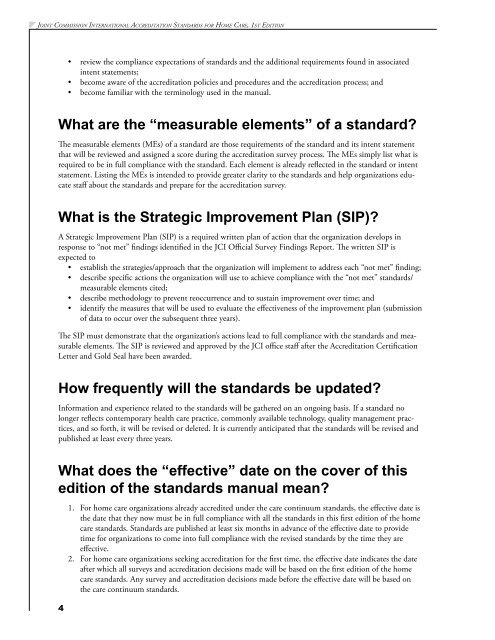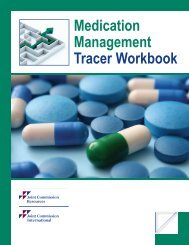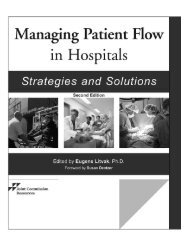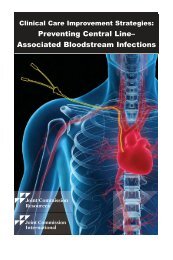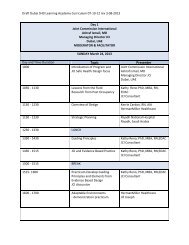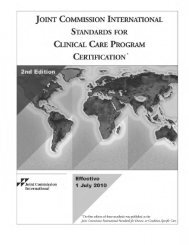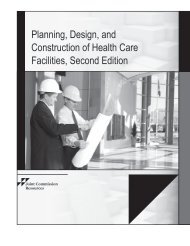Download 'Sample Pages' - Store - Joint Commission International
Download 'Sample Pages' - Store - Joint Commission International
Download 'Sample Pages' - Store - Joint Commission International
Create successful ePaper yourself
Turn your PDF publications into a flip-book with our unique Google optimized e-Paper software.
<strong>Joint</strong> <strong>Commission</strong> <strong>International</strong> Accreditation Standards for Home Care, 1st Edition<br />
• review the compliance expectations of standards and the additional requirements found in associated<br />
intent statements;<br />
• become aware of the accreditation policies and procedures and the accreditation process; and<br />
• become familiar with the terminology used in the manual.<br />
What are the “measurable elements” of a standard?<br />
The measurable elements (MEs) of a standard are those requirements of the standard and its intent statement<br />
that will be reviewed and assigned a score during the accreditation survey process. The MEs simply list what is<br />
required to be in full compliance with the standard. Each element is already reflected in the standard or intent<br />
statement. Listing the MEs is intended to provide greater clarity to the standards and help organizations educate<br />
staff about the standards and prepare for the accreditation survey.<br />
What is the Strategic Improvement Plan (SIP)?<br />
A Strategic Improvement Plan (SIP) is a required written plan of action that the organization develops in<br />
response to “not met” findings identified in the JCI Official Survey Findings Report. The written SIP is<br />
expected to<br />
• establish the strategies/approach that the organization will implement to address each “not met” finding;<br />
• describe specific actions the organization will use to achieve compliance with the “not met” standards/<br />
measurable elements cited;<br />
• describe methodology to prevent reoccurrence and to sustain improvement over time; and<br />
• identify the measures that will be used to evaluate the effectiveness of the improvement plan (submission<br />
of data to occur over the subsequent three years).<br />
The SIP must demonstrate that the organization’s actions lead to full compliance with the standards and measurable<br />
elements. The SIP is reviewed and approved by the JCI office staff after the Accreditation Certification<br />
Letter and Gold Seal have been awarded.<br />
How frequently will the standards be updated?<br />
Information and experience related to the standards will be gathered on an ongoing basis. If a standard no<br />
longer reflects contemporary health care practice, commonly available technology, quality management practices,<br />
and so forth, it will be revised or deleted. It is currently anticipated that the standards will be revised and<br />
published at least every three years.<br />
What does the “effective” date on the cover of this<br />
edition of the standards manual mean?<br />
<br />
1. For home care organizations already accredited under the care continuum standards, the effective date is<br />
the date that they now must be in full compliance with all the standards in this first edition of the home<br />
care standards. Standards are published at least six months in advance of the effective date to provide<br />
time for organizations to come into full compliance with the revised standards by the time they are<br />
effective.<br />
2. For home care organizations seeking accreditation for the first time, the effective date indicates the date<br />
after which all surveys and accreditation decisions made will be based on the first edition of the home<br />
care standards. Any survey and accreditation decisions made before the effective date will be based on<br />
the care continuum standards.


